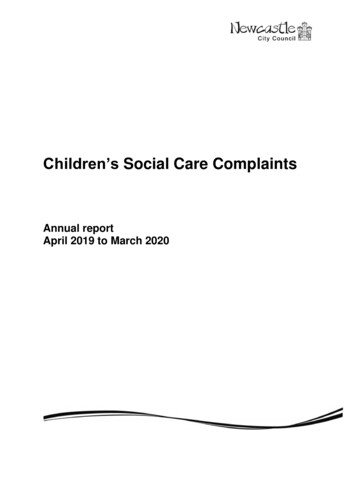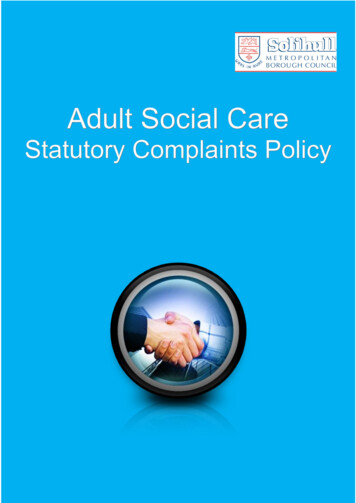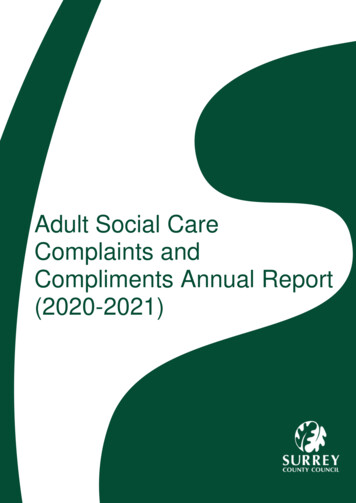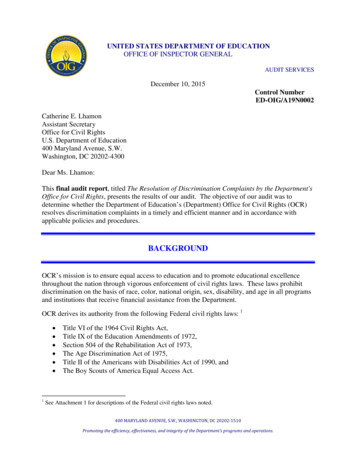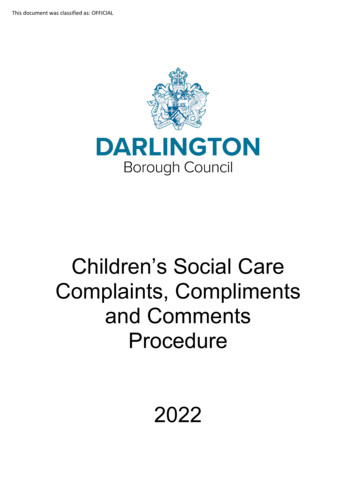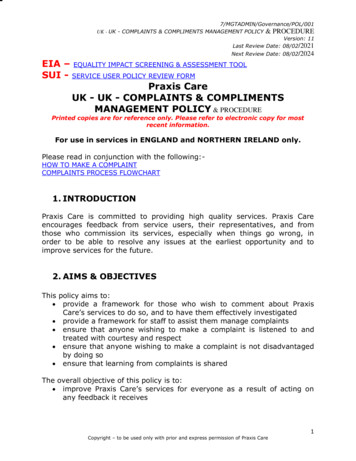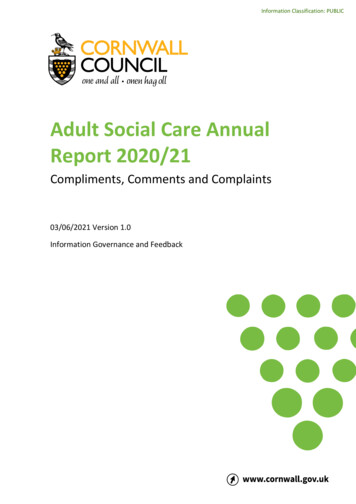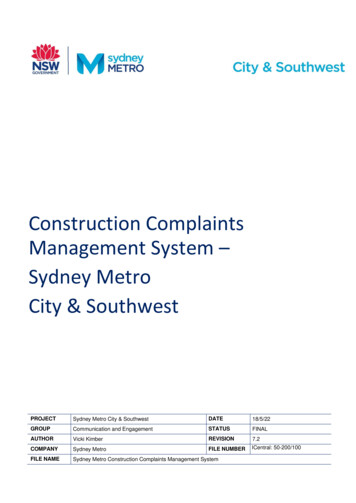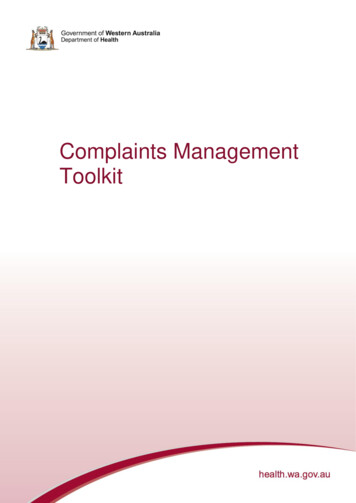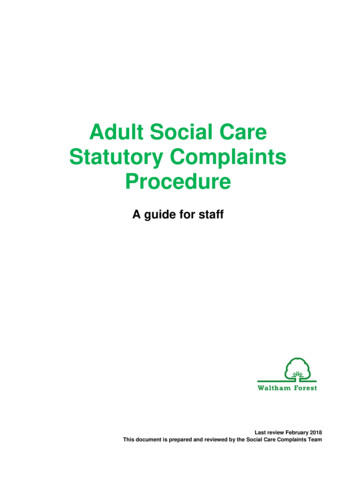
Transcription
Adult Social CareStatutory ComplaintsProcedureA guide for staffLast review February 2018This document is prepared and reviewed by the Social Care Complaints Team
Table of Contents1.About this guidance . 22.Overview . 33.What is a complaint?. 34.Who can complain? . 45.What may be complained about? . 46.What cannot be complained about? . 57.The 12-month rule. 58.Contracted Services and Other Cross Boundary Issues. 69.Managing the Complaints Process . 810.Responding to a complaint. 1011.Complaints to the Local Government and Social Care Ombudsman . 1212.Persistent and Vexatious Complainants . 1313.Organisational Learning . 1314.Recording. 1415.Monitoring . 1416.Roles and Responsibilities . 15Appendix 1 – Local Resolution Stage Response Template. 17Appendix 2 – Responding to Social Care Complaints . 19Appendix 3 – Suggested paragraphs for use within complaint responses . 20Adult Social Care Statutory Complaints Procedure – A Guide for StaffLast review February 2018Page 1
1. About this guidance1.1This document is prepared and regularly reviewed by the Social Care ComplaintsTeam, which currently forms part of the corporate Complaints Team within SupplyChain, Finance & Governance Directorate. The Social Care Complaints Teamworks with services within the Families & Homes Directorate in dealing withstatutory social care complaints.1.2The Statutory Social Care Complaints Procedure (‘the Procedure’) aims to offerservice users and carers a process of solving problems or disagreements betweenthemselves and the Council’s Adult Social Care service. The procedure alsoprovides people with an opportunity to make positive suggestions, comments orcompliments. At the heart of the Procedure is the emphasis on listening to users ofour services.1.3The Procedure on its own cannot do this in isolation. It is dependent on workers’active involvement and participation. Staff at all levels have a valuable role to play;therefore, it is very important that complaints are responded to promptly and withintimescale.1.4Service Users and their advocates/carers have a right to make suggestions,comments, criticisms or complaints about Adult Social Care, the services providedor the services they think they should receive.1.5By listening to service users and carers and seeking to resolve problems quickly,we will be going a long way towards making Adult Social Care more open andresponsive to the needs of the local community. In this way we hope to continuallyimprove the quality of our services.1.6The way an organisation handles complaints is a good indication of how it views itscustomers or users. The more sensitively and effectively a complaint is handled,and this includes providing responses within statutory timescales, the more itdemonstrates the care and recognition given by that organisation to the users’ orthe customers’ needs and rights.1.7Complaints referred to throughout this document are primarily those related toservices provided under the statutory Adult Social Services legislation; however,some complaints fall outside of the statutory remit and are dealt with as a‘Corporate Complaint’; this has a separate process and timescale, details of whichcan be found on ForestHub resident-insight-and-performance/complaints.htm) and on the Council’swebsite ts).1.8Generally people do not like to complain. People have to put themselves out tocomplain and many do not expect anything positive to happen as a result. AdultSocial Care aims to have a culture which encourages members of the public tomake positive and negative comments about services as well as to feel someownership and ability to influence the services which they pay for and which theCouncil (or its contractors) provide.Adult Social Care Statutory Complaints Procedure – A Guide for StaffLast review February 2018Page 2
1.9It is therefore necessary to ensure that there is within Adult Social Care a climatethat assures people that complaints will be listened to, taken seriously andresponded to speedily and fairly.1.10 The converse to the complaints procedure is good publicity, so that members of thepublic are aware of what services are (or are not) available, and under whatcircumstances they are entitled to receive those services. They should also haveadvance warning about any changes to a service. Managers have a responsibilityto be vigilant in the provision of information as required.1.11 In carrying out their duties staff may and do receive suggestions and compliments.Where these are made by the service user in writing staff are encouraged to notifythe Social Care Complaints Team as this too is valuable feedback on Adult SocialCare’s performance.2. Overview2.1This document sets out the way in which complaints should be dealt with in relationto what is collectively known as Adult Social Care Services; therefore applies toservice provision to older people, people with a physical disability, people with alearning disability, people with mental health issues and other vulnerable people.2.2The statutory basis for the complaints procedure is: The Local Authority SocialServices and National Health Service Complaints (England) Regulations 2009.2.3This procedure does not apply to concerns raised about a vulnerable adult. Suchmatters should dealt with under the Safeguarding Adults procedure; which can befound on ForestHub, hamforest/directory/advice.page?id 7TTu6wnSTXU2.4The responsibility for responding to a complaint within the published timescale restswith the ‘responding manager’ (usually the Team Manager) at the Local ResolutionStage, and the Social Care Complaints Manager at the other stages of thecomplaints process.2.5However, it is only through Council officers co-operating and working together thatcomplainants will receive an appropriate response to their complaints, with promptand adequate action taken if a satisfactory service has not been provided.2.6To provide an effective and efficient response to complaints, a response templateand guidance are provided as appendices at the end of this document.3. What is a complaint?3.1The definition of a complaint can vary between councils and therefore be treateddifferently, depending on interpretation. We accept and use the Local Governmentand Social Care Ombudsman (LGO) definition, which is:An expression of dissatisfaction about a council service (whether that serviceis provided directly by the council or by a contractor or partner) that requiresAdult Social Care Statutory Complaints Procedure – A Guide for StaffLast review February 2018Page 3
a response. There is no difference between a ‘formal’ and an ‘informal’complaint. Both are expressions of dissatisfaction that require a response.4. Who can complain?4.1A representation or complaint may be made by: 4.2A service user;Someone who has been turned down for a service to which they think they areeligible;The representative of a service user – as long as consent is given, this can beanyone acting on the service user’s behalf, such as;o The representative of a service user who does not have capacity within themeaning of the Mental Capacity Act 2005, as long as they are seen to beacting in the interests of that service usero On behalf of somebody who has died or is a childo Anyone who is or is likely to be affected by the actions, decisions oromissions of the service that is subject to a complaint.A complaint can only be made by or on behalf of/by someone to whom the LocalAuthority may have the duty or power to provide a service. Any decision that acomplainant is not a qualifying complainant will be made by the Social CareComplaints Manager in consultation with the appropriate service manager. Thecomplainant will be informed of this decision in writing.5. What may be complained about?5.1A complaint could be about any matter reasonably connected with the exercise ofAdult Social Care’s statutory functions. We are accountable for all the services weprovide, whether directly from our own resources, or through contracts with otheragencies, and we have a duty to investigate or arrange the investigation ofcomplaints about any aspect of these services.5.2Where a service is delivered in partnership with another organisation (such as theNHS or mental health services), we hold joint responsibility for ensuring that thecomplaint received is investigated either jointly or separately, as appropriate.5.3If we receive a complaint that relates wholly to services provided by the NHS, theSocial Care Complaints Manager must within five working days of receipt ask thecomplainant if they wish us to send the complaint on to the other organisation. Ifconsent is given, the Social Care Complaints Team will refer the case on to therelevant organisation within 3 working days.5.4A complaint may arise as a result of many things relating to service functions, butmost commonly about: An unwelcome or disputed decisionAdult Social Care Statutory Complaints Procedure – A Guide for StaffLast review February 2018Page 4
Concern about the quality or appropriateness of a serviceDelay in decision making or provision of servicesDelivery or non-delivery of services including complaints proceduresQuantity, frequency, change or cost of a serviceAttitude or behaviour of staff6. What cannot be complained about?6.1There are occasions when this procedure is not the appropriate one to use. Forexample: When the initial contact is a request for serviceWhen the issue is about something other than social care provision, and thecorporate complaints procedure would be more appropriateComplaints about Children and Young People’s Services, as there is aseparate procedure for such complaintsWhere the issue of the complaint is over 12 months old, unless there areexceptional circumstances – see the section “The 12-month rule”Allegation of staff misconduct, as this is dealt with under a separateprocedure (HR)Appeals against Court rulingsMatters under consideration by the Courts, for example prosecutionsA criminal Police investigation is invokedMulti-agency safeguard vulnerable adults procedures are invokedThe same complaint has already been dealt with through this procedure orhas been to the Local Government and Social Care Ombudsman7. The 12-month rule7.1 The complaint should be made “in time”. In making a decision on whether acomplaint is in time or not, the Council adopts the approach of the Local Governmentand Social Care Ombudsman (LGO).The LGO may not entertain a complaint unless it is made to him or her within 12months from the day on which the complainant first had notice of the mattersalleged in the complaint, although the Ombudsman has discretion to conduct aninvestigation not made within 12 months if he or she considers it to be reasonableto do so.7.2 We would normally only investigate complaints made to the Council in relation tomatters that have occurred or have been raised with the Council within the past 12months.7.3 One of the main reasons for applying this cut-off time is that the more time passesfrom an event occurring, the more difficult it is to establish the facts with a sufficientdegree of certainty to enable the Council to make a definitive decision on thecomplaint. This could be because circumstances have changed, officers have leftAdult Social Care Statutory Complaints Procedure – A Guide for StaffLast review February 2018Page 5
their employment with the Council or records are no longer available.7.4 Consideration should be given to whether the complainant could reasonably havebeen expected to submit the complaint earlier, or whether the complainant wasaware of the issue being complained about within the previous 12 months. Even ifan event occurred over 12 months ago, but the customer only found out about itwithin the previous 12 months, we cannot refuse to deal with the complaint.7.5 Some complaints might contain an element of past events together with events thathave taken place more recently. Where records permit, events that occurred in thepast can be taken into account when investigating more recent issues.ImportantThe 12-month rule should not be applied without proper consideration ofall the circumstances surrounding the complaint and should never beapplied as a blanket rule for dealing with complaints about events thatoccurred 12 months previously.Each case should be considered on its own merit. The Social CareComplaints Team and Adult Social Care Service will work together todecide on applying this rule. Consideration should be given to signposting complainants to other routes, such as insurance, for example ifthere is a claim of negligence.8. Contracted Services and Other Cross Boundary Issues8.1An area of confusion arises around boundaries between the Council’s responsibilityand those of other bodies delivering services on behalf of the Council, for example: 8.2Domiciliary care through a private agencyResidential care/nursing homesContracted agencies and multi-agency servicesAdult placement schemesSocial work reports submitted to CourtSafeguarding vulnerable adultsMulti-agency health service packagesSingle or joint assessmentsProtocols are in place for successful handling of these complaints. Partner agencieswill have appropriate procedures of their own in place for responding to complaintsAdult Social Care Statutory Complaints Procedure – A Guide for StaffLast review February 2018Page 6
in the first instance. This will be part of the contracting procedure and will bereferred to and monitored by the Contracts and Commissioning Team.8.3Complaints about Direct Payments8.3.1 Service users and their representatives cannot raise issues under thisprocedure about services that they arrange and pay for themselves, througha direct payment or a personal budget. However issues that relate to AdultSocial Care’s role in Direct Payments or Personalised Budgets can be dealtwith under this process, for example: 8.4Assessing the amount of service providedThe advice and assistance given in setting up such paymentsComplaints about Contracted Services8.4.1 Adults Social Care is increasingly working with the independent sector incommissioning services for our service users. Although all commissionedservice providers are required to have their own complaints procedures inplace, when people have concerns about these services, they can choose tohave their concerns addressed through the Adult Social Care procedure.8.4.2 If a provider receives a complaint they must inform the complainant that theyhave a right to refer the complaint directly to the Council for consideration.8.5Regulated Services complaints8.5.1 Residential Care Homes, Nursing Homes and Homecare agencies areregulated under the Health and Social Care Act 2008 (Regulated Activities)Regulations 2014, which requires these providers to have their owncomplaints procedures, and are themselves subject to regulations andnational minimum standards.8.5.2 Such complaints do not fall for investigation under the Adult Social CareComplaints Procedure, as the provider is required to respond to complaints inthe first instance. However, if Adult Social Care commissioned services onthe user’s behalf, the complaint would fall within the scope of this complaintsprocedure.8.5.3 Therefore, if after exhausting the provider’s complaints process, thecomplainant remains dissatisfied, the complaints can be reviewed under ourprocedures to ensure that the provider has carried out a robust investigation.8.5.4 Where the complaint received is considered as a serious quality of care issueor a concern about a person’s well-being, the matter will be referred to AdultsSocial Care to deal with as a safeguarding matter.8.6Single integrated complaints processAdult Social Care Statutory Complaints Procedure – A Guide for StaffLast review February 2018Page 7
8.6.1 Our complaints procedure reflects the requirements and principles of ‘MakingExperiences Count’, a procedure which is designed to ensure that there is asingle complaint process across all health and social care organisations.This will provide a unified approach to complaints about integrated servicesand where complaints are made across organisations.8.6.2 We are required to ensure that there is co-ordinated handling for suchcomplaints and to advise and support complainants through the procedure. Ifa complaint is received by Adult Social Care that appears to contain acomplaint relating to a NHS body: Permission from the complainant must be sought to pass on to thecomplaints manager at the NHS to which it relates; The Social Care Complaints Manager will liaise with the NHSComplaints Manager to decide which body will take the lead and howthe complaint will be managed, in accordance with the Regulations; The Complaints Managers will decide who will liaise with thecomplainant; The complainant must be informed as to what options are available todeal with their complaint; The emphasis will be on providing a single response to thecomplainant.8.6.3 Each organisation will ensure that any lessons learned are identified andaddressed. If the complaint is solely about health-related services, notprovided directly by the Council, the Social Care Complaints Manager, withthe permission of the complainant, should pass the complaint to the relevantNHS body within 3 working days.9. Managing the Complaints Process9.1Service User confidentiality9.1.1 Information held about service users and carers is subject to the DataProtection Act 1998, and people have a right to see the information that theCouncil holds about them. They can make a Subject Access Request in thisregard; for more details, please see ForestHub.9.1.2 All information disclosed about a complainant must be confined to that whichis relevant to the investigation of the complaint and only disclosed to thosepeople who have a demonstrable need to know.9.2Consent to disclose confidential information9.2.1 The service user’s express consent is not required to access informationabout him/her for the purpose of investigating a complaint raised by thatservice user. Where a complaint is made by a carer or relative about issuesthat affect them in their role as carer or relative consent is not required.9.2.2 Where a complaint is made on behalf of a service user who has notAdult Social Care Statutory Complaints Procedure – A Guide for StaffLast review February 2018Page 8
authorised access or discussion of their records to a third party, thecomplaint should be investigated but care must be given not to discloseconfidential information.9.2.3 Where a service user lacks capacity and someone with Lasting Power ofAttorney (LPA) has been appointed to act on their behalf, then the LPAshould be consulted as long as the LPA specifically states that they haveauthority to consent on behalf of the service user.9.2.4 Where a service user lacks capacity and has no-one to support them then areferral should be made to the relevant Independent Mental CapacityAdvocacy Service (IMCA).9.3Third party confidentiality9.3.1 Particular care must be taken where the service user’s records containinformation provided in confidence by or about a third party.9.3.2 Only information which is relevant to the complaint should be considered fordisclosure and then only to those within the Council who have ademonstrable need to know. It must not be disclosed to the service userunless the person providing the information has expressly consented to thedisclosure.9.3.3 Disclosure of information provided by a third party outside the council alsorequires the express consent of the third party. If they object then it can onlybe disclosed when there is an overriding public interest. The Social CareComplaints Team should be consulted in these situations.9.4Providing support for complainants9.4.1 We will provide clear information on how to complain, where to receivesupport and how to take complaints further. The council promotes the use ofindependent advocates to support service users in making complaints. TheSocial Care Complaints Team will advise complainants accordingly.9.5Providing support for staff9.5.1 It is important that staff experience the investigation of complaints as beingfair and objective. A member of staff who is the subject of a complaint will begiven details of the complaint that has been made about them. Theinvestigating manager will interview the member of staff and give them theopportunity to express their view of the events surrounding the complaint.The investigating manager must be given access to, or copies of, any recordsthey have made in connection with the incident referred to in the complaint.The investigating manager should feedback the outcomes of the investigationtogether with any recommendations to all staff/service areas directly involvedwith the complaint.Adult Social Care Statutory Complaints Procedure – A Guide for StaffLast review February 2018Page 9
9.5.2 Any member of staff subject to a complaint investigation has the right to havea supporter or Union representative present during a fact finding interview.10.Responding to a complaint10.1Possible Safeguarding Issues10.1.1 The Social Care Complaints Team reviews all complaints received and will refer anyconcerns to Adults Social Care as a safeguarding issue where there is: 10.2any allegation or suspicion of abuse, serious neglect, serious misconductany incident which appears to have resulted in significant harmany incident which relates to deatha possible criminal offenceProcedure before investigation – 3 working days10.2.1 Complainants are expected to use the Council’s online complaints portal to logtheir complaints. This system is referred to internally as Firmstep/Achieve. Acomplainant is required to self-register on the system and this creates an accountthat the complainant can access by a password of their own choice. When acomplaint is logged through the online portal, an automated acknowledgment issent through the system once a complaint has been reviewed and accepted forinvestigation under the procedure. If a complainant chooses to write a letter ofcomplaint, the Social Care Complaints Team will create a record for the complainton the system and will issue an acknowledgement by letter (if the customer hasnot provided an email address). The Team Manager in Adult Social Care has 20working days to investigate and respond to a complaint.10.2.2 There might be instances where the complainant cannot make a complaint onlineor in writing. In exceptional circumstances (for example, if the customer has adisability that prevents them from writing), a complaint will be accepted by phone.In such cases a written record should be made and the details confirmed with thecomplainant before the complaint is processed.10.2.3 All complaints received directly by the service must be forwarded to the SocialCare Complaints Team for recording on the online system. The Social CareComplaints Team will arrange for an acknowledgement to be sent to thecomplainant through the system or by letter.10.2.4 Where the complaint relates to the care and treatment of a third party who hascapacity, the Social Care Complaints Team will seek their consent, as outlinedabove.10.2.5 If the issues raised in the complaint indicate serious risk/abuse then asafeguarding alert will be raised and the concerns referred to Adults Social Care.The complaint will be closed and the complainant will be informed of this decision.10.2.6 If Adults Social Care do not consider that there is a safeguarding issue toinvestigate, then the complaint will be re-instated.Adult Social Care Statutory Complaints Procedure – A Guide for StaffLast review February 2018Page 10
10.2.7 The Social Care Complaints Team normally allocates a complaint to the TeamManager of the case-holding team as indicated on Mosaic. If the team manager isnamed in the complaint it is then sent to the Service Manager.10.2.8 Complaints are allocated to services through the Firmstep/Achieve system.10.3 Investigation and response – 20 Working days10.3.1 The aim of the investigation is to gather sufficient factual and other information todetermine what has happened and to identify any appropriate action needed. Theresponse should address all the issues in the complaint letter and also includeadditional points agreed during any telephone conversation or meeting with thecomplainant.10.3.2 As part of the resolution process the Investigating Officer should offer a meetingwith the complainant to clarify the issues involved and outcomes being sought. Arange of options may be offered to the complainant as appropriate, including: a facilitated meeting with staff involved in the complaintmeeting with managersoffer of a re-assessmentchange of workerfinancial remedyAs much as possible, action taken, such as meetings, should take place within the20 working day period so as to ensure that the complaint is resolved andresponded to within the set timescale.10.3.3 It may be possible at the meeting to resolve some or all of the concerns to thecomplainant’s satisfaction. Notes of the meeting, including all agreements made,should be incorporated into the response letter.10.3.4 The timescale for investigation and responding to a complaint is 20 working days.In complex case this may be extended, but the Social Care Complaints Team willadvise regarding this.10.3.5 The responding manager will provide a detailed response addressing all of theissues raised in the complaint, using the template supplied. Each issue should beidentified as upheld or not upheld or partly upheld with the supporting evidence tojustify the conclusions.10.3.6 Where an issue complained about is upheld, specific reference should be made toaction taken to minimise risk of reoccurrence. It should also include information onhow the complainant can take the complaint further if they are dissatisfied withAdult Social Care’s response.10.3.7 The Social Care Complaints Team are available to review draft responses forAdult Social Care Statutory Complaints Procedure – A Guide for StaffLast review February 2018Page 11
quality assurance, should the responding manager choose to send them beforethe response deadline date.10.3.8 Complaints about the financial issues in respect of care packages, residentialcare/nursing homes placements, Direct Payments, Virtual Budgets, and otherfinance aspects of personalisation and choice are dealt with as an appeal to theQuality Assurance Meeting (QAM Panel).10.3.9 This means that the no investigation takes place; however, the complaint andbackground papers are presented to and discussed by QAM, where the personalbudget/care package is reviewed in light of the complaint.10.3.10 The Social Care Complaints Team will log the complaint in the usual way andinform the complainant of the appeal process. The process of allocation is thesame as described above, the only difference is that QAM will make the decisionin respect of the appeal.10.3.11 It is the Team Manager’s responsibility to write to the complainant after the Panel’smeeting with details of the outcome. A response template is attached as anappendix, and can be found on ForestHub.10.4 Corporate Complaints10.4.1 The Corporate Complaints Procedure is used mainly in respect of council policy oradministrative decisions; for example, issues regarding Community Care Chargesor Data Protection Act issues.10.4.2 These types of complaints are not always straightforward, so the Social CareComplaints Team will advise the responding manager at the time, if the mattershould be dealt with as a corporate complaint.10.4.3 The timescale and process for dealing with these complaints is the same, exceptthat there is a Stage 2 procedure if the complainant remains dissatisfied with theinitial response.10.4.5 The Corporate Complaints Team conducts the Stage 2 investigations and contactsthe service area directly for information. More information and copies of thecorporate complaints procedures can be found on ForestHub.11.Complaints to the Local Government and Social Care Ombudsman11.1 Where a complainant remains dissatisfied with the handling of the complaint andAdult Social Care believes that
Chain, Finance & Governance Directorate. The Social Care Complaints Team works with services within the Families & Homes Directorate in dealing with statutory social care complaints. 1.2 The Statutory Social Care Complaints Procedure ('the Procedure') aims to offer service users and carers a process of solving problems or disagreements between
